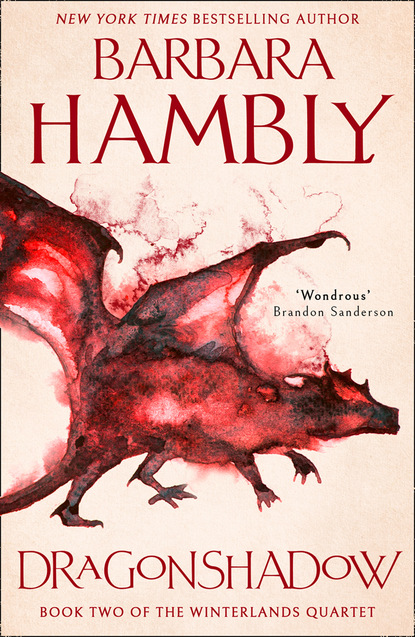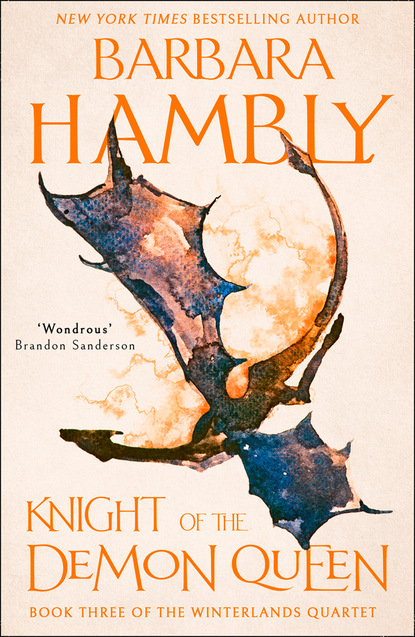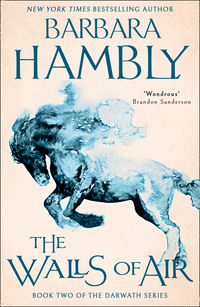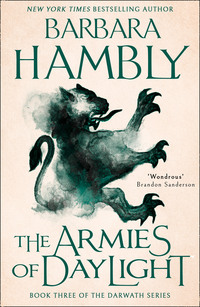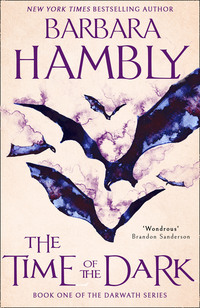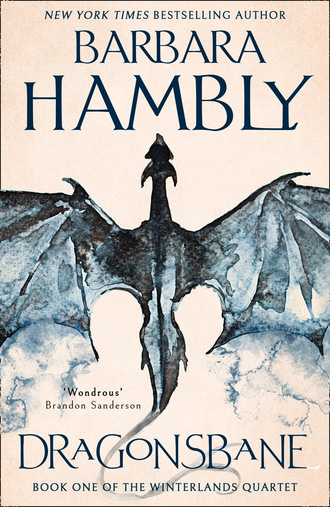
Полная версия
Dragonsbane
“It might have been, had he been fighting a man who had honorably challenged him—something John has never been known to do in his life. Even fighting bandits, it pays to strike from behind when one is outnumbered. As the only representative of the King’s law in these lands, John generally is outnumbered. A dragon is upward of twenty feet long and can kill a man with a single blow of its tail. You said yourself,” she added with a smile, “that there are situations in which honor does not apply.”
“But that’s different!” the boy said miserably and lapsed into disillusioned silence.
The ground beneath the horses’ feet was rising; the vague walls of the misty tunnel through which they rode were ending. Beyond, the silvery shapes of the round-backed hills could be dimly seen. As they came clear of the trees, the winds fell upon them, clearing the mists and nipping their clothes and faces like ill-trained dogs. Shaking the blowing handfuls of her hair out of her eyes, Jenny got a look at Gareth’s face as he gazed about him at the moors. It wore a look of shock, disappointment, and puzzlement, as if he had never thought to find his hero in this bleak and trackless world of moss, water, and stone.
As for Jenny, this barren world stirred her strangely. The moors stretched nearly a hundred miles, north to the ice-locked shores of the ocean; she knew every break in the granite landscape, every black peat-beck and every hollow where the heather grew thick in the short highlands summers; she had traced the tracks of hare and fox and kitmouse in three decades of winter snows. Old Caerdinn, half-mad through poring over books and legends of the days of the Kings, could remember the time when the Kings had withdrawn their troops and their protection from the Winterlands to fight the wars for the lordship of the south; he had grown angry with her when she had spoken of the beauty she found in those wild, silvery fastnesses of rock and wind. But sometimes his bitterness stirred in Jenny, when she worked to save the life of an ailing village child whose illness lay beyond her small skills and there was nothing in any book she had read that might tell her how to save that life; or when the Iceriders came raiding down over the floe-ice in the brutal winters, burning the barns that cost such labor to raise, and slaughtering the cattle that could only be bred up from such meager stock. However, her own lack of power had taught her a curious appreciation for small joys and hard beauties and for the simple, changeless patterns of life and death. It was nothing she could have explained; not to Caerdinn, nor to this boy, nor to anyone else.
At length she said softly, “John would never have gone after the dragon, Gareth, had he not been forced to it. But as Thane of Alyn Hold, as Lord of Wyr, he is the only man in the Winterlands trained to and living by the arts of war. It is for this that he is the lord. He fought the dragon as he would have fought a wolf, as a vermin which was harming his people. He had no choice.”
“But a dragon isn’t vermin!” Gareth protested. “It is the most honorable and greatest of challenges to the manhood of a true knight. You must be wrong! He couldn’t have fought it simply—simply out of duty. He can’t have!”
There was a desperation to believe in his voice that made Jenny glance over at him curiously. “No,” she agreed. “A dragon isn’t vermin. And this one was truly beautiful.” Her voice softened at the recollection, even through the horror-haze of death and fear, of its angular, alien splendor. “Not golden, as your song calls it, but a sort of amber, grading to brownish smoke along its back and ivory upon its belly. The patterns of the scales on its sides were like the beadwork on a pair of slippers, like woven irises, all shades of purple and blue. Its head was like a flower, too; its eyes and maw were surrounded with scales like colored ribbons, with purple horns and tufts of white and black fur, and with antennae like a crayfish’s tipped with bobs of gems. It was butcher’s work to slay it.”
They rounded the shoulder of a tor. Below them, like a break in the cold granite landscape, spread a broken line of brown fields where the mists lay like stringers of dirty wool among the stubble of harvest. A little further along the track lay a hamlet, disordered and trashy under a bluish smear of woodsmoke, and the stench of the place rose on the whipping ice-winds: the lye-sting of soap being boiled; an almost-visible murk of human and animal waste; the rotted, nauseating sweetness of brewing beer. The barking of dogs rose to them like churchbells in the air. In the midst of it all a stumpy tower stood, the tumble-down remnant of some larger fortification.
“No,” said Jenny softly, “the dragon was a beautiful creature, Gareth. But so was the girl it carried away to its lair and killed. She was fifteen—John wouldn’t let her parents see the remains.”
She touched her heels to Moon Horse’s sides and led the way down the damp clay of the track.
“Is this village where you live?” Gareth asked, as they drew near the walls.
Jenny shook her head, drawing her mind back from the bitter and confusing tangle of the memories of the slaying of the dragon. “I have my own house about six miles from here, on Frost Fell—I live there alone. My magic is not great; it needs silence and solitude for its study.” She added wryly, “Though I don’t have much of either. I am midwife and healer for all of Lord Aversin’s lands.”
“Will—will we reach his lands soon?”
His voice sounded unsteady, and Jenny, regarding him worriedly, saw how white he looked and how, in spite of the cold, sweat ran down his hollow cheeks with their faint fuzz of gold. A little surprised at his question, she said, “These are Lord Aversin’s lands.”
He raised his head to look at her, shocked. “These?” He stared around him at the muddy fields, the peasants shouting to one another as they shocked up the last of the corn, the ice-scummed waters of the moat that girdled the rubble fill and fieldstone patches of the shabby wall. “Then—that is one of Lord Aversin’s villages?”
“That,” Jenny said matter-of-factly as the hooves of their horses rumbled hollowly on the wood of the draw-bridge, “is Alyn Hold.”
The town huddled within the curtain wall—a wall built by the present lord’s grandfather, old James Standfast, as a temporary measure and now hoary with fifty winters—was squalid beyond description. Through the archway beneath the squat gatehouse untidy houses were visible, clustered around the wall of the Hold itself as if the larger building had seeded them, low-built of stone and rubble upon the foundations of older walls, thatched with river reed-straw and grubby with age. From the window-turret of the gatehouse old Peg the gatekeeper stuck her head out, her long, gray-streaked brown braids hanging down like bights of half-unraveled rope, and she called out to Jenny, “You’re in luck,” in the glottal lilt of the north-country speech. “Me lord got in last night from ridin’ the bounds. He’ll be about.”
“She wasn’t—was she talking about Lord Aversin?” Gareth whispered, scandalized.
Jenny’s crescent-shaped eyebrows quirked upward. “He’s the only lord we have.”
“Oh.” He blinked, making another mental readjustment. “‘Riding the bounds’?”
“The bounds of his lands. He patrols them, most days of the month, he and militia volunteers.” Seeing Gareth’s face fall, she added gently, “That is what it is to be a lord.”
“It isn’t, you know,” Gareth said. “It is chivalry, and honor, and …” But she had already ridden past him, out of the slaty darkness of the gatehouse passage and into the heatless sunlight of the square.
With all its noise and gossipy squalor, Jenny had always liked the village of Alyn. It had been the home of her childhood; the stone cottage in which she had been born and in which her sister and brother-in-law still lived—though her sister’s husband discouraged mention of the relationship—still stood down the lane, against the curtain wall. They might regard her with awe, these hard-working people with their small lives circumscribed by the work of the seasons, but she knew their lives only a little less intimately than she knew her own. There was not a house in the village where she had not delivered a child, or tended the sick, or fought death in one of the myriad forms that it took in the Winterlands; she was familiar with them, and with the long-spun, intricate patterns of their griefs and joys. As the horses sloshed through mud and standing water to the center of the square, she saw Gareth looking about him with carefully concealed dismay at the pigs and chickens that shared the fetid lanes so amicably with flocks of shrieking children. A gust of wind blew the smoke of the forge over them, and with it a faint wash of heat and a snatch of Muffle the smith’s bawdy song; in one lane laundry flapped, and in another, Deshy Werville, whose baby Jenny had delivered three months ago, was milking one of her beloved cows half-in, half-out of her cottage door. Jenny saw how Gareth’s disapproving gaze lingered upon the shabby Temple, with its lumpish, crudely carved images of the Twelve Gods, barely distinguishable from one another in the gloom, and then went to the circled cross of Earth and Sky that was wrought into the stones of so many village chimneys. His back got a little stiffer at this evidence of paganism, and his upper lip appeared to lengthen as he regarded the pigpen built out from the Temple’s side and the pair of yokels in scruffy leather and plaids who leaned against the railings, gossiping.
“Course, pigs see the weather,” one of them was saying, reaching with a stick across the low palings to scratch the back of the enormous black sow who reposed within. “That’s in Clivy’s On Farming, but I’ve seen them do it. And they’re gie clever, cleverer than dogs. My aunt Mary—you remember Aunt Mary?—used to train them as piglets and she had one, a white one, who’d fetch her shoes for her.”
“Aye?” the second yokel said, scratching his head as Jenny drew rein near them, with Gareth fidgeting impatiently at her side.
“Aye.” The taller man made kissing sounds to the sow, who raised her head in response with a slurping grunt of deepest affection. “It says in Polyborus’ Analects that the Old Cults used to worship the pig, and not as a devil, either, as Father Hiero would have it, but as the Moon Goddess.” He pushed his steel-rimmed spectacles a little higher on the bridge of his long nose, a curiously professorial gesture for a man ankle-deep in pig-muck.
“That a fact, now?” the second yokel said with interest. “Now you come to speak on it, this old girl—when she were young and flighty, that is—had it figured to a T how to get the pen gate open, and would be after … Oh!” He bowed hastily, seeing Jenny and the fuming Gareth sitting their horses quietly.
The taller of the two men turned. As the brown eyes behind the thick spectacle lenses met Jenny’s, they lost their habitual guarded expression and melted abruptly into an impish brightness. Middle-sized, unprepossessing, shaggy and unshaven in his scruffy dark leather clothing, his old wolfskin doublet patched with bits of metal and scraps of chain mail to protect his joints—after ten years, she wondered, what was there about him that still filled her with such absurd joy?
“Jen.” He smiled and held out his hands to her.
Taking them, she slid from the white mare’s saddle into his arms, while Gareth looked on in disapproving impatience to get on with his quest. “John,” she said, and turned back to the boy. “Gareth of Magloshaldon—this is Lord John Aversin, the Dragonsbane of Alyn Hold.”
For one instant, Gareth was shocked absolutely speechless. He sat for a moment, staring, stunned as if struck over the head; then he dismounted so hastily that he clutched his hurt arm with a gasp. It was as if, Jenny thought, in all his ballad-fed fantasies of meeting the Dragonsbane, it had never occurred to him that his hero would be afoot, not to say ankle-deep in mud beside the local pigsty. In his face was plain evidence that, though he himself was over six-foot-three, and must be taller than anyone else he knew, he had never connected this with the fact that, unless his hero was a giant, he would perforce be shorter also. Neither, she supposed, had any ballad mentioned spectacles.
Still Gareth had not spoken. Aversin, interpreting his silence and the look on his face with his usual fiendish accuracy, said, “I’d show you my dragon-slaying scars to prove it, but they’re placed where I can’t exhibit ’em in public.”
It said worlds for Gareth’s courtly breeding—and, Jenny supposed, the peculiar stoicism of courtiers—that, even laboring under the shock of his life and the pain of a wounded arm, he swept into a very creditable salaam of greeting. When he straightened up again, he adjusted the set of his cloak with a kind of sorry hauteur, pushed his bent spectacles a little more firmly up onto the bridge of his nose, and said in a voice that was shaky but oddly determined, “My lord Dragonsbane, I have ridden here on errantry from the south, with a message for you from the King, Uriens of Belmarie.” He seemed to gather strength from these words, settling into the heraldic sonority of his ballad-snatch of golden swords and bright plumes in spite of the smell of the pigsty and the thin, cold rain that had begun to patter down.
“My lord Aversin, I have been sent to bring you south. A dragon has come and laid waste the city of the gnomes in the Deep of Ylferdun; it lairs there now, fifteen miles from the King’s city of Bel. The King begs that you come to slay it ere the whole countryside is destroyed.”
The boy drew himself up, having delivered himself of his quest, a look of noble and martyred serenity on his face, very like, Jenny thought, someone out of a ballad himself. Then, like all good messengers in ballads, he collapsed and slid to the soupy mud and cowpies in a dead faint.
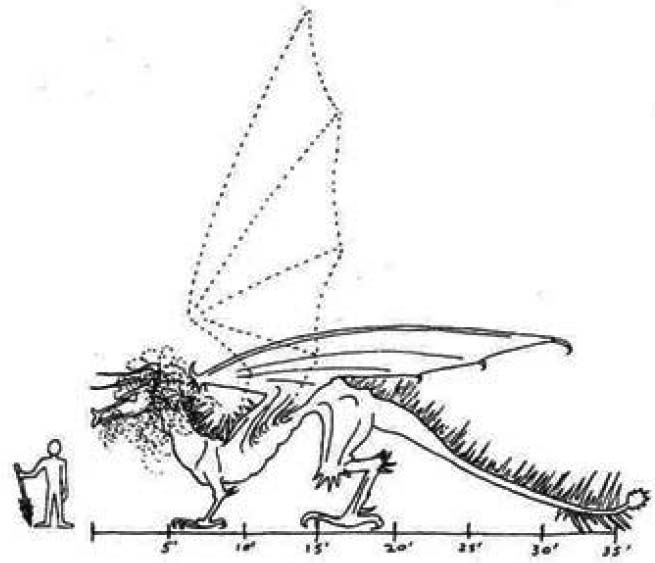
Scale and Structure of a Dragon
(From John Aversin’s notes)
1 Mane structure and spikes at joints are thicker than shown. A bone “shield” extends from the back of the skull beneath the mane to protect the nape of the neck.
2 Golden Dragon of Wyr measured approx. 27’ of which 12’ was tail; there are rumors of dragons longer than 50’.
TWO

RAIN DRUMMED STEADILY, drearily, on the walls of Alyn Hold’s broken-down tower. The Hold’s single guest room was never very bright; and, though it was only mid-afternoon, Jenny had summoned a dim ball of bluish witchfire to illuminate the table on which she had spread the contents of her medicine satchel; the rest of the little cubbyhole was curtained in shadow.
In the bed, Gareth dozed restlessly. The air was sweet with the ghosts of the long-dried fragrances of crushed herbs; the witchlight threw fine, close-grained shadows around the desiccated mummies of root and pod where they lay in the circles Jenny had traced. Slowly, rune by rune, she worked the healing spells over them, each with its own Limitation to prevent a too-quick healing that might harm the body as a whole, her fingers patiently tracing the signs, her mind calling down the qualities of the universe particular to each, like separate threads of unheard music. It was said that the great mages could see the power of the runes they wrought glowing like cold fire in the air above the healing powders and sense the touch of it like plasmic light drawn from the fingertips. After long years of solitary meditation, Jenny had come to accept that, for her, magic was a depth and a stillness rather than the moving brilliance that it was for the great. It was something she would never quite become reconciled to, but at least it kept her from the resentment that would block what powers she did have. Within her narrow bounds, she knew she worked well.
The key to magic is magic, Caerdinn had said. To be a mage, you must be a mage. There is no time for anything else, if you will come to the fullness of your power.
So she had remained in the stone house on Frost Fell after Caerdinn had died, studying his books and measuring the stars, meditating in the crumbling circle of ancient standing stones that stood on the hillcrest above. Through the slow years her powers had grown with meditation and study, though never to what his had been. It was a life that had contented her. She had looked no further than the patient striving to increase her powers, while she healed others where she could and observed the turning of the seasons.
Then John had come.
The spells circled to their conclusion. For a time silence hung on the air, as if every hearth brick and rafter shadow, the fragrance of the applewood fire and the guttural trickle of the rain, had been preserved in amber for a thousand years. Jenny swept the spelled powders together into a bowl and raised her eyes. Gareth was watching her fearfully from the darkness of the curtained bed.
She got to her feet. As she moved toward him, he recoiled, his white face drawn with accusation and loathing. “You are his mistress!”
Jenny stopped, hearing the hatred in that weak voice. She said, “Yes. But it has nothing to do with you.”
He turned his face away, fretful and still half-dreaming. “You are just like her,” he muttered faintly. “Just like Zyerne …”
She stepped forward again, not certain she had heard clearly. “Who?”
“You’ve snared him with your spells—brought him down into the mud,” the boy whispered and broke off with a feverish sob. Disregarding his repulsion, she came worriedly to his side, feeling his face and hands; after a moment, he ceased his feeble resistance, already sinking back to sleep. His flesh felt neither hot nor overly chilled; his pulse was steady and strong. But still he tossed and murmured, “Never—I never will. Spells—you have laid spells on him—made him love you with your witcheries …” His eyelids slipped closed.
Jenny sighed and straightened up, looking down into the flushed, troubled face. “If only I had laid spells on him,” she murmured. “Then I could release us both—had I the courage.”
She dusted her hands on her skirt and descended the narrow darkness of the turret stair.
She found John in his study—what would have been a fair-sized room, had it not been jammed to overflowing with books. For the most part, these were ancient volumes, left at the Hold by the departing armies or scavenged from the cellars of the burned-out garrison towns of the south; rat-chewed, black with mildew, unreadable with waterstains, they crammed every shelf of the labyrinth of planks that filled two walls and they spilled off to litter the long oak table and heaped the floor in the corners. Sheets of notes were interleaved among their pages and between their covers, copied out by John in the winter evenings. Among and between them were jumbled at random the tools of a scribe—prickers and quills, knives and inkpots, pumice stones—and stranger things besides: metal tubes and tongs, plumb-bobs and levels, burning-glasses and pendulums, magnets, the blown shells of eggs, chips of rock, dried flowers, and a half-disassembled clock. A vast spiderweb of hoists and pulleys occupied the rafters in one corner, and battalions of guttered and decaying candles angled along the edges of every shelf and sill. The room was a magpie-nest of picked-at knowledge, the lair of a tinkerer to whom the universe was one vast toyshop of intriguing side issues. Above the hearth, like a giant iron pinecone, hung the tail-knob of the dragon of Wyr—fifteen inches long and nine through, covered with stumpy, broken spikes.
John himself stood beside the window, gazing through the thick glass of its much-mended casement out over the barren lands to the north, where they merged with the bruised and tumbled sky. His hand was pressed to his side, where the rain throbbed in the ribs that the tail-knob had cracked.
Though the soft buckskin of her boots made no sound on the rutted stone of the floor, he looked up as she came in. His eyes smiled greeting into hers, but she only leaned her shoulder against the stone of the doorpost and asked, “Well?”
He glanced ceilingward where Gareth would be lying. “What, our little hero and his dragon?” A smile flicked the corners of his thin, sensitive mouth, then vanished like the swift sunlight of a cloudy day. “I’ve slain one dragon, Jen, and it bloody near finished me. Tempting as the promise is of getting more fine ballads written of my deeds, I think I’ll pass this chance.”
Relief and the sudden recollection of Gareth’s ballad made Jenny giggle as she came into the room.
The whitish light of the windows caught in every crease of John’s leather sleeves as he stepped forward to meet her and bent to kiss her lips.
“Our hero never rode all the way north by himself, surely?”
Jenny shook her head. “He told me he took a ship from the south to Eldsbouch and rode east from there.”
“He’s gie lucky he made it that far,” John remarked, and kissed her again, his hands warm against her sides. “The pigs have been restless all day, carrying bits of straw about in their mouths—I turned back yesterday even from riding the bounds because of the way the crows were acting out on the Whin Hills. It’s two weeks early for them, but it’s in my mind this’ll be the first of the winter storms. The rocks at Eldsbouch are shipeaters. You know, Dotys says in Volume Three of his Histories—or is it in that part of Volume Five we found at Ember?—or is it in Clivy?—that there used to be a mole or breakwater across the harbor there, back in the days of the Kings. It was one of the Wonders of the World, Dotys—or Clivy—says, but nowhere can I find any mention of the engineering of it. One of these days I’m minded to take a boat out there and see what I can find underwater at the harbor mouth …”
Jenny shuddered, knowing John to be perfectly capable of undertaking such an investigation. She had still not forgotten the stone house he had blown up, after reading in some moldering account about the gnomes using blasting powder to tunnel in their Deeps, nor his experiments with water pipes.
Sudden commotion sounded in the dark of the turret stair, treble voices arguing, “She is, too!” and “Let go!” A muted scuffle ensued, and a moment later a red-haired, sturdy urchin of four or so exploded into the room in a swirl of grubby sheepskin and plaids, followed immediately by a slender, dark-haired boy of eight. Jenny smiled and held out her arms to them both. They flung themselves against her; small, filthy hands clutched delightedly at her hair, her skirt, and the sleeves of her shift, and she felt again the surge of ridiculous and illogical delight at being in their presence.
“And how are my little barbarians?” she asked in her coolest voice, which fooled neither of them.
“Good—we been good, Mama,” the older boy said, clinging to the faded blue cloth of her skirt. “I been good—Adric hasn’t.”
“Have, too,” retorted the younger one, whom John had lifted into his arms. “Papa had to whip Ian.”
“Did he, now?” She smiled down into her older son’s eyes, heavy-lidded and tip-tilted like John’s, but as summer blue as her own. “He doubtless deserved it.”
“With a big whip,” Adric amplified, carried away with his tale. “A hundred cuts.”
“Really?” She looked over at John with matter-of-fact inquiry in her expression. “All at one session, or did you rest in between?”
“One session,” John replied serenely. “And he never begged for mercy even once.”
“Good boy.” She ruffled Ian’s coarse black hair, and he twisted and giggled with pleasure at the solemn make-believe.
The boys had long ago accepted the fact that Jenny did not live at the Hold, as other boys’ mothers lived with their fathers; the Lord of the Hold and the Witch of Frost Fell did not have to behave like other adults. Like puppies who tolerate a kennelkeeper’s superintendence, the boys displayed a dutiful affection toward John’s stout Aunt Jane, who cared for them and, she believed, kept them out of trouble while John was away looking after the lands in his charge and Jenny lived apart in her own house on the Fell, pursuing the solitudes of her art. But it was their father they recognized as their master, and their mother as their love.


